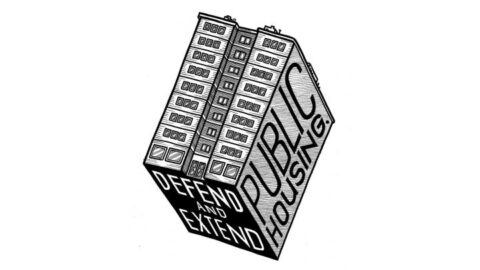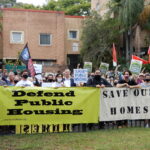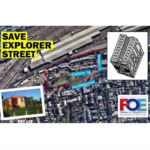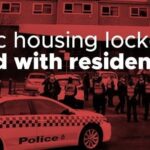Despite Roots, Albanese Neglects Public Housing: An Interview With APH’s Andrew Chuter
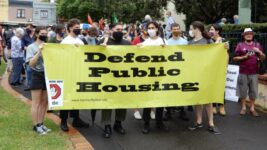
During his victory speech, newly incumbent PM Anthony Albanese reflected on his journey from a childhood growing up in “public housing down the road in Camperdown” to the top ministerial position in the country, saying he hopes it “inspires Australians to reach for the stars”.
However, in a social media post a few days later, Action for Public Housing (APH) displayed a photo of the 1927 premises that Albanese grew up in, outlining that when the prime minister was born, governments nationwide were building 10,000 public homes a year for a population of 11 million.
“For all the new PM’s talk about growing up in public housing and the vital support it provided him and his mum, he has no plan to extend that same support to people who need it today,” the housing advocacy group underscored.
Indeed, federal Labor’s policy platform notes that “there are more Australians renting, and renting for longer” and “more people experiencing homelessness than ever before”, but when it comes down to it the new government’s priority is making homeownership more affordable.
Privatising public housing
As Sydney public housing defender Andrew Chuter points out, when Labor’s policy does touch on public housing, it’s under the umbrella term of social housing, which includes both public and community housing.
Since 2002, successive NSW governments have been shifting to a privatisation model, whereby old public housing estates are sold to redevelopers, who then build larger blocks that comprise of 70 percent private apartments and 30 percent community housing.
Community housing is managed and sometimes owned by private not-for-profits, which means the government saves on upkeep, while the housing is less secure being subject to private market forces, and the redevelopments often result in less bedrooms for low-income tenants.
Advocates argue that public housing estates could be maintained but purposefully aren’t, and then the focus could be on building more. This would also better the plight of public housing tenants, who are often displaced for years during the redevelopment process, without any clear idea of their fate.
Major neglect
Housing affordability was a prominent issue this election, but both majors focused on ownership, with Labor’s government subsidies and the Coalition’s proposal to raid superannuation. So, the 148,000 households on the public housing waiting list nationwide have bascially been forgotten.
Action for Public Housing is one of a number of groups in NSW currently calling on both federal and state governments to return to the public housing model, which could easily see the 50,000 households on this state’s waiting list housed if the right to housing was prioritised in policy.
Sydney Criminal Lawyers spoke to Action for Public Housing spokesperson Andrew Chuter about the Albanese government’s apparent focus on affordable housing, the victories his group has had in saving pre-existing stock and the prospect of seeing the Perrottet state government voted out.
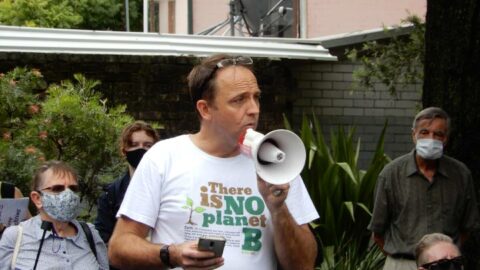
A lot has been said about the new PM’s rise to the top after coming from inner city public housing. Action for Public Housing, however, points out that the same sort of opportunity that he had won’t be afforded to many in similar circumstances under his government.
Andrew, what is the Albanese government promising in terms of public housing?
A lot of us public housing campaigners found it refreshing to hear Anthony Albanese talk about his public housing background in his election victory speech.
It’s unfortunate though that Labor policy on housing makes no mention of public housing, only “social and affordable housing”, which is either owned or operated by private providers, where the rents are higher and the protections for tenants are weaker.
Labor’s Housing Australia Future Fund is a plan to provide social housing for just one in every eight applicants currently on the waiting list over the next five years.
There are many more people than that in serious housing stress or have just given up and not bothered applying for public housing.
Albanese has already prioritised housing in a way that the Coalition didn’t during its decade in power. The PM has appointed a minister for housing in his new cabinet. And housing minister Julie Collins portfolio also takes in homelessness.
What are your thoughts on these developments?
This reflects that the housing situation has gradually gotten worse over the last decade, and sharply worse over the last three years.
It became a top issue so both major parties made prominent announcements about it just before the election in a hope to win voters, which basically failed.
All the analysis, even the mainstream outlets, were critical of their policies, saying it would push up house prices.
For a start, we mustn’t forget too that Albanese ditched previous policy to abolish negative gearing and capital gains tax exemptions, which, they correctly argued, push house prices upwards.
The Help to Buy scheme was just more fuel to the fire, pumping up the private market and predicated upon government recouping costs from rising prices.
Albanese tweeted during the campaign that “owning your own home gives people a sense of belonging”, which has a Thatcher-esque ring to it.
One would think that being part of a society that ensures our peoples’ basic needs are met would foster a greater sense of belonging.
If I went to the USA, I’d feel proud that we have Medicare, at least some form of universal health care, but if someone visited Sydney from Vienna, where 60 percent of people live in public housing funded by a 1 percent income tax, I’d be ashamed of the homelessness and state of disrepair of our public housing.
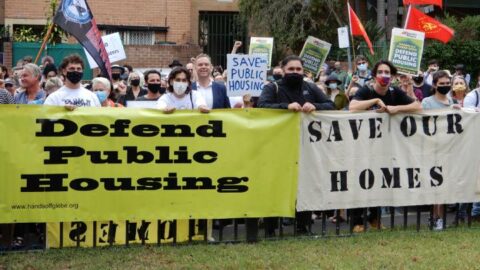
Early last year, a coalition of NSW housing groups, including Action for Public Housing, stepped up the campaign to not only expand public housing, but to ensure that pre-existing stock is kept public rather than redeveloped into something new.
This was in relation to plans to redevelop two public housing estates: one in Glebe and another in South Eveleigh.
Since 2016, the NSW Coalition government has been redeveloping public housing estates under the state Land and Housing Corporation’s Communities Plus program. But this doesn’t seem to have the best interests of pre-existing public housing tenants as its focus.
What’s actually happening in this state in terms of the privatisation of the public housing sector?
Well, the NSW Coalition government has sold $3 billion worth of public housing since coming to power.
The Communities Plus model requires public housing to be self-funding. What that actually means is no funding.
The net result is that the proportion of public housing as a percentage of all housing has halved over the last 30 years.
One point that should be made is that selling inner city public housing land for outer-urban land is a false economy.
The outer suburbs are only cheap because the extra cost of providing new schools, hospitals, public transport, utilities, roads, parks and, of course, jobs is not factored in.
These areas are also car dependent and carbon intensive, something that must be avoided in a climate emergency.
The drive to privatise NSW public housing began two decades ago. It’s been a particular issue for Waterloo public housing residents, who were first warned they’d be relocated six years ago and continue to remain in limbo.
How would you describe the state of public housing in NSW at present?
It’s really bad. When I was talking to residents in Waterloo, they all complained about mould, leaking roofs and other maintenance issues that were being ignored.
You ran in the federal election as the Socialist Alliance candidate for the seat of Sydney. Public housing was a key focus of your party’s policy platform. What sort of reforms does SA advocate?
During our campaign, we were talking about universal public housing, which advocates such as Barney Gardner from Millers Point and Emily Bullock of Glebe point to.
There are all kinds of tax exemptions for the wealthy, as well as massive overspending on defence, that must be scaled back and used to address the housing crisis.
I pointed specifically to a new building in Alexandria built by Defence Housing Australia that was built at one-third the cost of similar private housing in the area.
The government could build 150,000 homes a year if it scrapped $60 billion in tax concessions for the wealthy.
Then it could provide universal public homes to anyone that wanted to live in them for 20 percent of their income.
And lastly, Andrew, considering Albanese has prioritised affordable housing, as well as homelessness, in a parliament that features strong progressive crossbenches, do you see a chance for greater reforms than what’s initially on offer?
The election is certainly a positive outcome, but real change will only come if we keep pushing and building our social movements.
In parliament, the Greens will be key to applying pressure, as they have a good policy for a million public and affordable homes.
I can see us definitely continuing to have successes as we have built Action for Public Housing into a fighting force.
One of our first wins was tripling the number of social homes at the Cowper Street Glebe redevelopment.
Then, after we held a BBQ and protested at Explorer Street Eveleigh, the government quietly removed the demolition plans from their website, along with the link to the whole discredited Communities Plus program.
We also called for a developer levy for affordable housing, which was later announced in the City of Sydney.
We have recently started a new campaign for 100 percent public housing on a vacant site at 600 Elizabeth Street Redfern.
Then we flooded the Planning Department with 2,700 objections to their plans to demolish and privatise South Waterloo.
The focus over the next nine months will be to defeat the NSW coalition government and from there, we’re just going to grow in strength through a national coalition of public housing action groups that forces federal and state governments to take the problem seriously.
